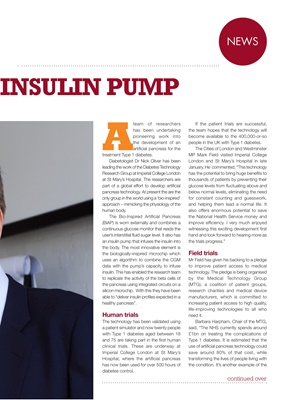
INSULIN PUMP
continued over
NEWS
A
team of researchers
has been undertaking
pioneering work into
the development of an
artificial pancreas for the
treatment Type 1 diabetes.
Diabetologist Dr Nick Oliver has
been leading the work of the Diabetes
Technology Research Group at Imperial
College London at St Mary's Hospital.
The researchers are part of a global effort
to develop artificial pancreas technology.
At present the are the only group in the
world using a 'bio-inspired' approach -
mimicking the physiology of the human
body.
The Bio-Inspired Artificial Pancreas
(BiAP) is worn externally and combines a
continuous glucose monitor that reads the
user's interstitial fluid sugar level. It also has
an insulin pump that infuses the insulin into
the body. The most innovative element is
the biologically-inspired microchip which
uses an algorithm to combine the CGM
data with the pump's capacity to infuse
insulin. This has enabled the research team
to replicate the activity of the beta cells of
the pancreas using integrated circuits on a
silicon microchip. With this they have been
able to "deliver insulin profiles expected in a
healthy pancreas".
Human trials
The technology has been validated using
a patient simulator and now twenty people
with Type 1 diabetes aged between 18
and 75 are taking part in the first human
clinical trials. These are underway at
Imperial College London at St Mary's
Hospital, where the artificial pancreas
has now been used for over 500 hours of
diabetes control.
If the patient trials are successful,
the team hopes that the technology will
become available to the 400,000-or-so
people in the UK with Type 1 diabetes.
The Cities of London and Westminster
MP Mark Field visited Imperial College
London and St Mary's Hospital in late
January. He has commented, "This
technology has the potential to bring
huge benefits to thousands of patients
by preventing their glucose levels from
fluctuating above and below normal
levels, eliminating the need for constant
counting and guesswork, and helping
them lead a normal life. It also offers
enormous potential to save the National
Health Service money and improve
efficiency. I very much enjoyed witnessing
this exciting development first hand and
look forward to hearing more as the trials
progress."
Field trials
Mr Field has given his backing to a pledge
to improve patient access to medical
technology. The pledge is being organised
by the Medical Technology Group
(MTG), a coalition of patient groups,
research charities and medical device
manufacturers, which is committed to
increasing patient access to high quality,
life-improving technologies to all who
need it.
Barbara Harpham, Chair of the MTG,
said, "The NHS currently spends around
£1 billion on treating the complications
of Type 1 diabetes. It is estimated that
the use of artificial pancreas technology
could save around 80% of that cost, while
transforming the lives of people living with